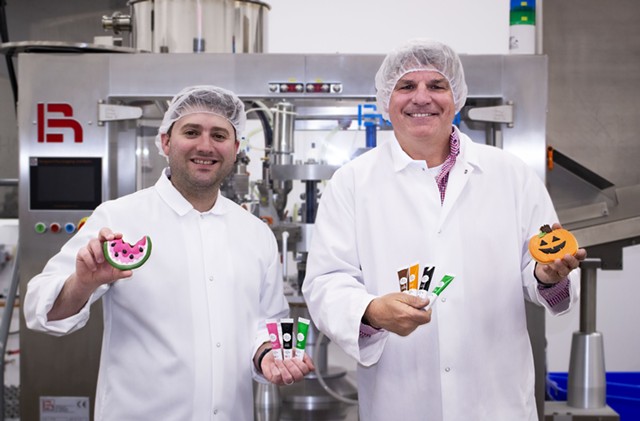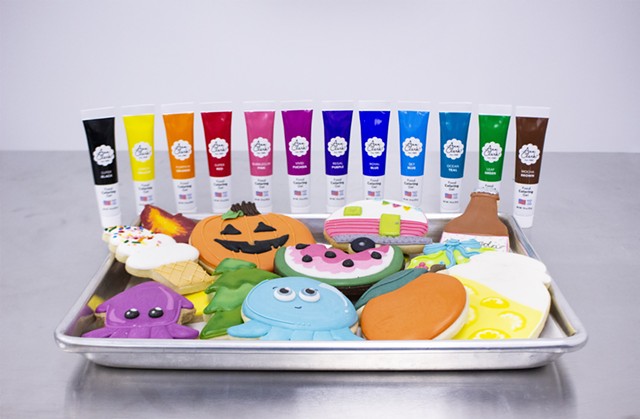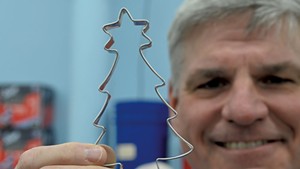
- Ann Clark
- Steve Montanez and Ben Clark with cookies
But there’s nothing sweet about its take on the competition in China. On May 11, the Rutland manufacturer filed 37 complaints to the U.S. Food and Drug Administration, saying some of the Chinese companies that sell food color in the United States are using illegal ingredients that are known carcinogens.
The Chinese products also identify themselves as FDA-approved — a claim that the federal agency does not permit for any food, medication or supplement.
CEO Ben Clark, whose mother Ann started the eponymous cookie cutter company in 1970, sells Ann Clark products around the world. He's trying to get the Chinese offenders removed from marketing sites such as Amazon.
“Our hope is that the FDA is going to do the research and call Amazon and all those products will get shut down,” Clark said.

- Ann Clark
- Ann Clark food colors
Early last year, as supply chain problems hit American manufacturers, Ann Clark’s U.S. supplier couldn’t produce the food coloring it needed for cookie kits. So employee Steve Montanez, an accountant who used to own a chocolate company, volunteered to make the coloring in-house.
Related Shortage of Materials Forces Vermont Companies to Get Creative

Shortage of Materials Forces Vermont Companies to Get Creative
Business
“We’re trying to make food coloring as fast as we can,” he said.
Ann Clark the company has claimed for several years that it’s the largest cookie-cutter maker in the world. But that's not big enough for Ben Clark, who would like to capture the global cookie-making accessories market. With a report showing that about 55 percent of the food coloring sold globally comes from China, he’s got the Chinese companies in his sights.
“We’re battling on Amazon every day,” he said.
Ben Clark and Montanez filed the FDA complaint after they ordered 37 of their competitors’ food colorings from Amazon and studied them. Thirty of the products appear to come from the same manufacturer, Lianyungang Xinai Food Technology. They wrote to the companies to make sure all of the ingredients in the colors were listed, and the companies wrote back with the names of some chemicals that weren’t, Clark said. Clark and Montanez looked up those ingredients and found that they were dyes called Red 2 and Red 6 that are listed by the FDA as safe only for drug and cosmetic use.
“We said, ‘Wait a minute, this is an illegal product,’” Clark said. “This gives us a huge opportunity.”
The FDA has acknowledged receiving the complaints. Asked by Seven Days wether the regulator can remove products from Amazon, a spokeswoman said it would take several days to reply. The FDA's website does list some warning letters relating to "unapproved and misbranded products." It pledges to alert the public when products or companies place consumers at risk, and urges online retailers like Amazon to stop selling potentially dangerous products. Clark hopes the agency can go further.
“Our big picture, our nirvana, would be that all of the Chinese guys are shut down,” Ben Clark said. That would mean, he noted, that any of that food coloring on container ships or in store inventory would have to be thrown away.
“They’d be off Amazon, which would dramatically open up the market,” he said.
If the Chinese products were removed from Amazon, he said, his biggest competitors would be Americolor and Chefmaster, both in California, and Wilton, an Illinois company that was recently purchased by the German conglomerate Dr. August Oetker KG.
“And that would mean the four of us would be playing for who can win and be the biggest," Clark said.






Comments
Comments are closed.
From 2014-2020, Seven Days allowed readers to comment on all stories posted on our website. While we've appreciated the suggestions and insights, right now Seven Days is prioritizing our core mission — producing high-quality, responsible local journalism — over moderating online debates between readers.
To criticize, correct or praise our reporting, please send us a letter to the editor or send us a tip. We’ll check it out and report the results.
Online comments may return when we have better tech tools for managing them. Thanks for reading.